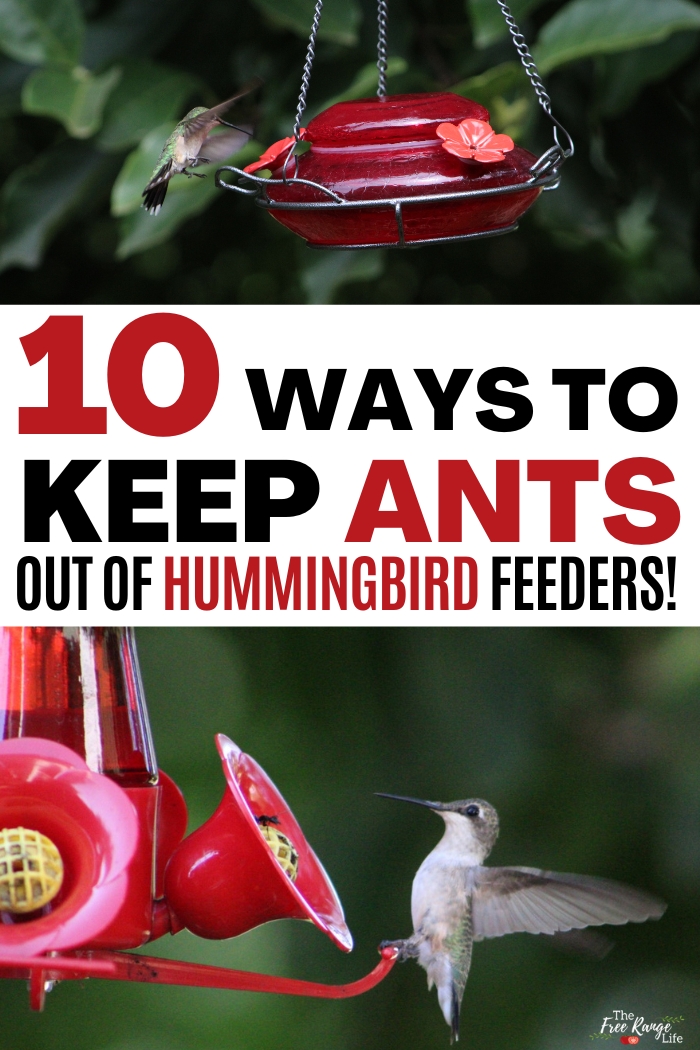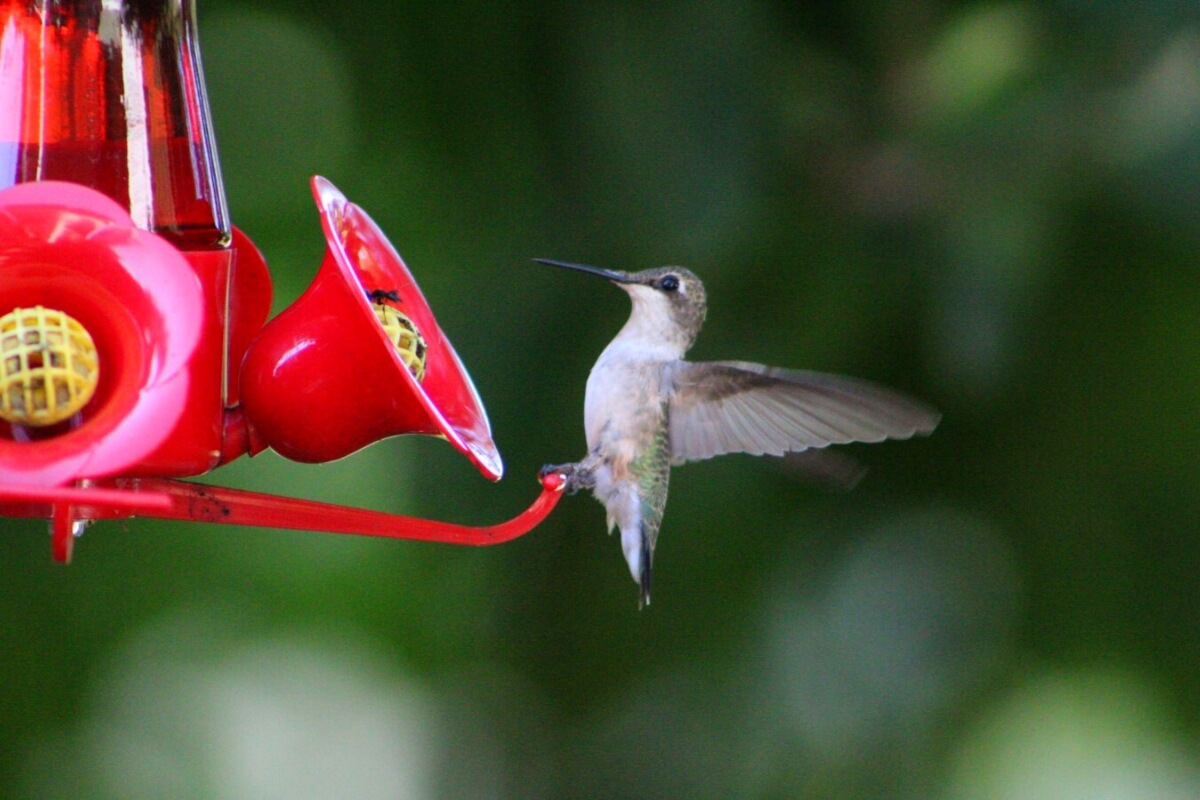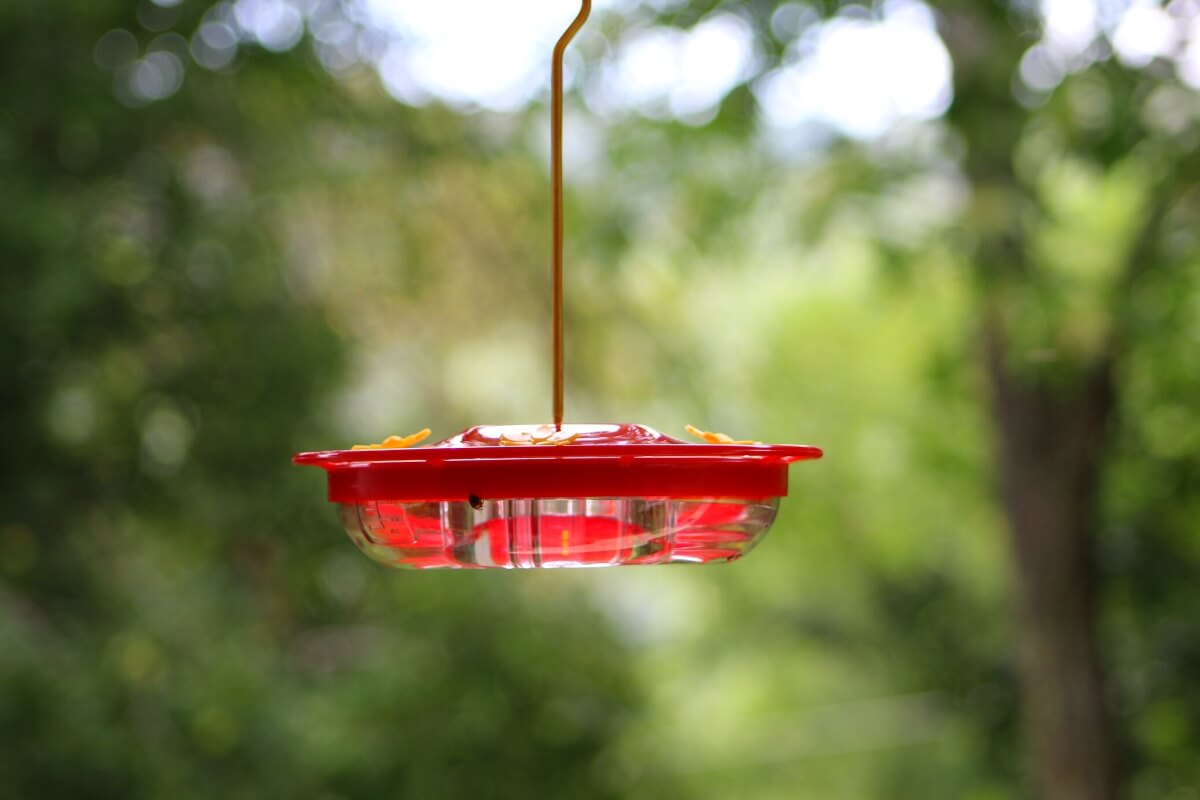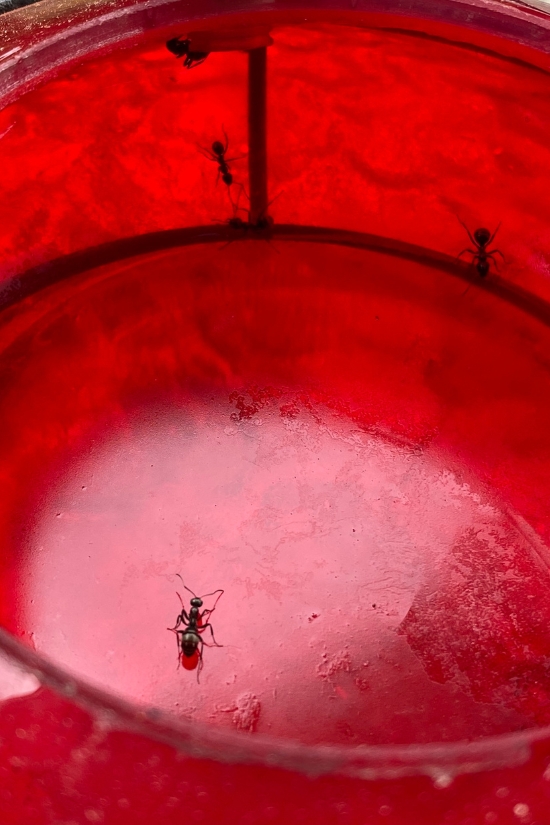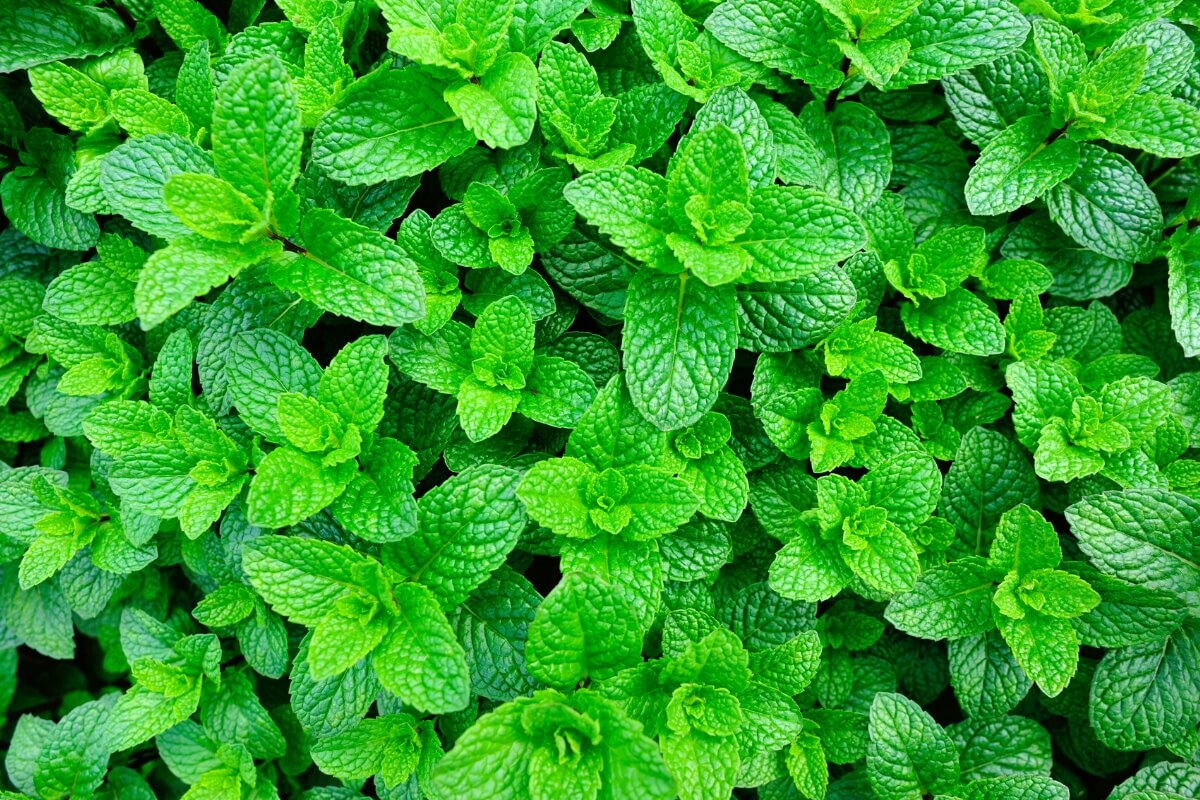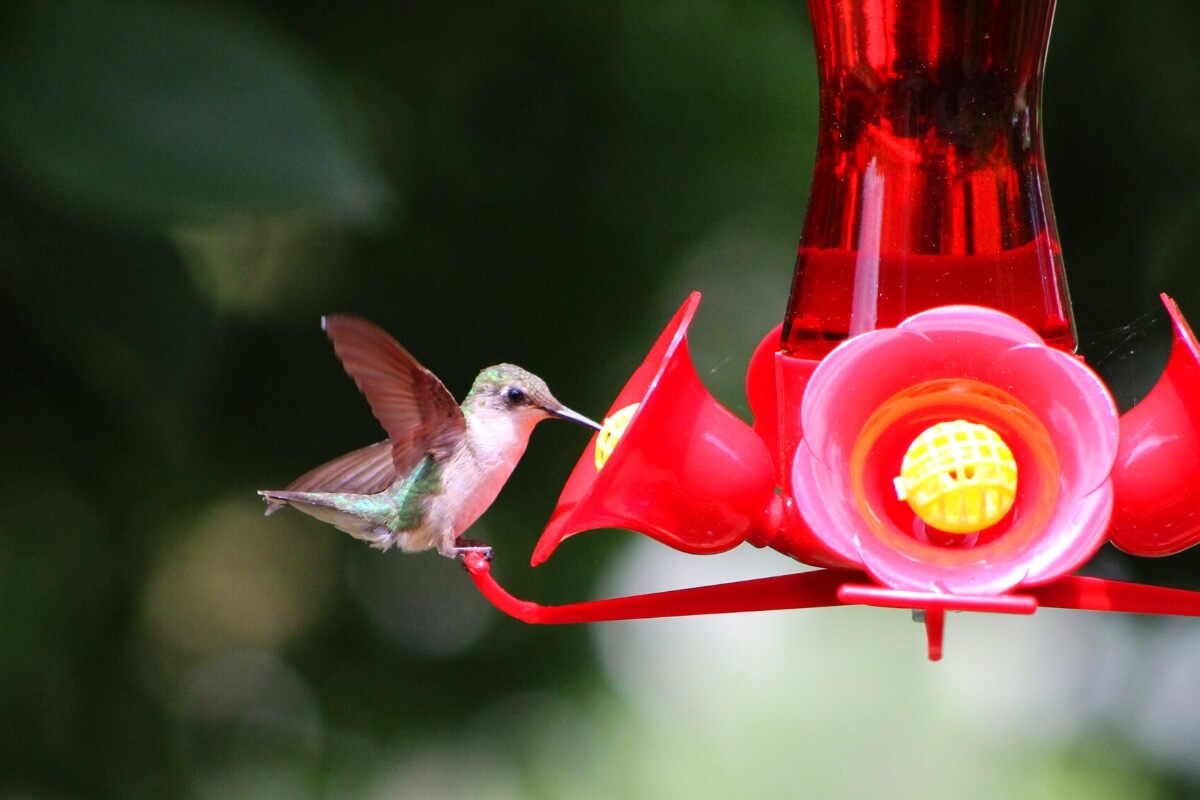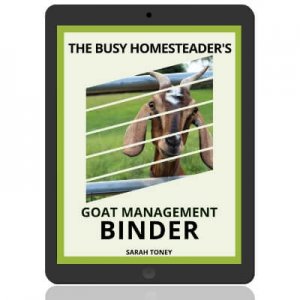Are you a hummingbird lover who loves having hummingbird feeders in your garden, but hates the ants that come along with them? Try these 10 ways to keep ants out of your hummingbird feeder today to banish those pesky insects forever!
There’s nothing worse than taking the time to make hummingbird nectar and fill all your feeders and then having ants take over. I absolutely hate when I see by beautiful feeders filled with ants floating inside.
This site contains affiliate links. If you make a purchase using one of these links, I may earn a commission. Please see my disclosure page for more information about cookies collected and our privacy policy.
Luckily, over the years I have learned some tricks to keeping my feeders ant free (or as close to ant free as possible!).
Most years I have no less than half a dozen hummingbird feeders in my yard, and over the years I’ve had plenty of visitors to my feeders that are NOT hummingbirds.
Bees, wasps, butterflies…
Once I had a butterfly sit and gorge itself on nectar from a feeder until it was so full it could no longer fly.
But ants are the worst! Once they find your feeders they can be hard to control and get rid of. And they can actually prevent hummingbird from visiting the feeders as well.
So let’s talk about how to keep ants out of your hummingbird feeders so you can enjoy these more of these beautiful birds.
(New to hummingbirds? Here’s how to attract them in the first place!)
10 Proven Ways to Keep Ants Out of Your Hummingbird Feeder
Ready to kick those ants to the curb?
Keep reading for 10 ways to keep your hummingbird feeders ant free!
Clean up Spills Immediately
Ants are after the sweet, sugary nectar in your hummingbird feeders and will be attracted to the smell of your feeders.
Spills can happen easily- when you’re refilling, a windy day, from larger birds landing on the feeders,etc- but it’s important to clean up these spills immediately to prevent ants from finding the spilled nectar and then searching out the source.
Choose Your Placement Carefully
In my garden I’ve hung hummingbird feeders in a couple of ways. One, using shepherd hooks. And two, screwing hooks into the joists of my covered front deck.
And, I bet you can guess which ones the ants found first!
The shepherd hooks were placed directly in the ground in the middle of my flower garden and ants found them on day one. On my deck it took a couple weeks before ants found them and even then the amount of ants was way less.
All that to say, when deciding where to place your hummingbird feeders, be sure to take into account accessibility for ants.
As an added bonus- my cats can’t reach the ones on the deck either!
Use an Ant Moat
Many hummingbird feeders come with ant moats on them- though they are usually pretty shallow and don’t do much to prevent ants from crossing.
But you can purchase (or DIY) an ant moat that is hung between the hook and the feeder that can be filled with water to prevent ants from reaching the feeder in the first place.
If you live in an area that gets very hot and sunny, be sure to check and refill your ant moat daily.
Be sure not to put anything other than water in the ant moat since hummingbirds can also use it for a source of drinking water.
Make it Sticky
Ants have to climb to reach your hummingbird feeders, so it makes sense to stop them by preventing them from climbing in the first place.
Some people say to use petroleum jelly or oil, and that can work as long as you keep these products far away from where they can affect the hummingbirds.
I sometimes just use really sticky duct tape. I wrap it sticky side out around the lower portion of my shepherd hooks and the ants stick to it as they try to climb
.
You do have to replace the tape as it fills with ants or if it gets wet, but it can be very effective at keeping ants out of hummingbird feeders!
Hang Your Hummingbird Feeder with Fishing Line
Again, ants have to climb to reach your hummingbird feeders, so it’s your job to make this climb as difficult as possible.
Fishing line is very thin and slippery, making it a great option for hanging feeders.
Be sure to choose a fishing line that can support the weight of your feeder and the resting weight of at least a few hummingbirds.
And make sure you use the correct knots for tying fishing line so that your feeder doesn’t fall and break!
Deter Ants with Cinnamon
Ants hate the smell of cinnamon and will avoid it. You can sprinkle the soil at the base of your feeder to deter ants from crossing to climb the pole.
You can also try dusting the pole or hook with cinnamon, but keep it away from the birds and nectar.
Use Mint as a Deterrent
Mint is also a great ant deterrent.
Try planting a patch of mint around the pole supporting your hummingbird feeder to keep ants away.
Use Essential Oils
Essential oils are a great way to deter ants from reaching your hummingbird feeder.
Oils can be sprayed on the soil and the lower portion of the pole to keep ants from climbing. I have also applied some directly to my deck poles to keep ants from reaching the hanging feeders.
A few essential oils to try are:
Sprinkle Diatomaceous Earth
I use diatomaceous earth in the garden all the time for pests. I use it in my home for fleas.
But it’s also great for ants!
Diatomaceous earth is the fossilized remains of diatoms. In insects, these sharp particles penetrate their exoskeleton, and then dry them out.
Sprinkle food-grade diatomaceous earth on the soil below your feeder to get rid of ants. Be sure to reapply after rain, as it only works when dry.
Keep Your Hummingbird Feeders Clean
And finally, keep your hummingbird feeders clean.
Chances are, even if you do all of the above, a few ants will still make it through. Not to mention, bees, wasps, and other pests that are drawn to nectar.
Regular cleaning removes the bugs and ensures that the hummingbirds are eating a safe, clean food source.
Giving them a good wash will also remove any scent trails left by ants, making it a little harder for them to find it again.
I hope these tips help you keep your hummingbird feeders free and clear of ants, so you can spend more time enjoying the birds instead!

